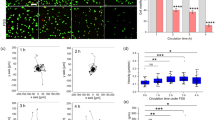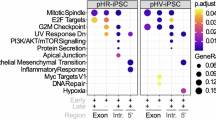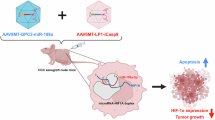Abstract
Gene therapy offers a new approach for treatment of cancer. Transfer of genes encoding immunostimulatory cytokines has been used with remarkable success to eliminate cancer in animals. However, clinical trials in patients with this strategy had limited efficacy. Therefore, improvement of gene transfer vector system is necessary. A hybrid viral vector, consisting of SFV replicon with either murine IL-12 or reporter LacZ gene, was constructed. This hybrid vector showed specificity and high level of expression in HCC both in vitro and in vivo. In a rat orthotropic liver tumor model, treatment of established tumors by the hybrid vector with mIL-12 gene resulted in a strong anti-tumor activity without accompanying toxicity. Subsequently, a helper-dependent adenovirus vectors containing a mifepristone (RU486) inducible system was constructed for controlled and liver-specific expression of human interleukin 12 (hIL-12) (HD-Ad/RUhIL-12) and mouse IL-12 (mIL-12) (HD-Ad/RUmIL-12). Data showed that high and sustained serum levels of hIL-12 could be attained by continuing administration of RU486 every 12 or 24 h. Repetitive induction of hIL-12 could be obtained over, at least, a period of 48 weeks after a single injection of HD-Ad/RUhIL-12. Treatment of liver metastases with of HD-Ad/RUmIL-12 plus RU846 resulted in complete tumor regression in all animals. Then, different cytokine genes were inserted into conditional replicative adenoviruses vectors (also called oncolytic adenovirus). Replication of adenovirus in tumor cells would kill tumor cells and release viruses, which infect surrounding tumor cells. The combination of cytopathic effect by oncolytic adenovirus and biological effect of transgene would exert strong antitumor activity. These new types of vectors may provide a potent and safe tool for cancer gene therapy.
Similar content being viewed by others
Log in or create a free account to read this content
Gain free access to this article, as well as selected content from this journal and more on nature.com
or
References
Roth C, Rochlitz C, Kourilsky P . Immune response against tumors. Adv Immunol 1994; 57:281–351.
Gabrilovich DI, Chen HL, Girgis KR, et al. Production of vascular endothelial growth factor by human tumors inhibits the functional maturation of dendritic cells. Nature Med 1996; 2:1096–103.
Melero I, Mazzolini G, Narvaiza I, et al. IL-12 gene therapy for cancer: in synergy with other immunotherapies. Trends Immunol 2001; 22:113–5.
Qian C, Sangro B, Prieto J . New strategies to enhance gene therapy efficiency. Gastroenterology 2002; 123: 639–42 .
Prieto J, Qian C, Sangro B, Melero I, Mazzolini G . Biological therapy of liver tumors. Surg Clin North Am 2004; 84:643–57.
Trinchieri G . Interleukin-12: a cytokine at the interface of inflammation and immunity. Adv Immunol 1998; 70:83–243.
Caruso M, Pham-Nguyen K, Kwong YL, et al. Adenovirus-mediated interleukin-12 gene therapy for metastatic colon carcinoma. Proc Natl Acad Sci U S A 1996; 93:11302–6.
Mazzolini G, Qian C, Xie X, et al. Tumor regression and long-term protection for colon cancer after intratumoral injection of adenovirus expressing IL-12. Cancer Gene Ther 1999; 5:514–22.
Barajas M, Mazzolini G, Genové G, et al. Gene Therapy of Orthotopic Hepatocellular Carcinoma in Rats Using Adenovirus Coding for interleukin-12 (IL-12). Hepatology 2001; 33:52–61.
Liu Y, Ehtesham M, Samoto K, et al. In situ adenoviral interleukin 12 gene transfer confers potent and long-lasting cytotoxic immunity in glioma. Cancer Gene Ther 2002; 9:9–15.
Nasu Y, Bangma CH, Hull GW, et al. Adenovirus-mediated interleukin-12 gene therapy for prostate cancer: suppression of orthotopic tumor growth and pre-established lung metastases in an orthotopic model. Gene Ther 1999; 6:338–49.
Zhang R, DeGroot LJ . Gene therapy of a rat follicular thyroid carcinoma model with adenoviral vectors transducing murine interleukin-12. Endocrinology 2003; 144:1393–8.
Divino CM, Chen SH, Yang W, et al. Antitumor immunity induced by interleukin-12 gene therapy in a metastatic model of breast cancer is mediated by natural killer cells. Breast Cancer Res Treat 2000; 60:129–34.
Mazzolini G, Narvaiza I, Bustos M, et al. Alpha(v)beta(3) integrin-mediated adenoviral transfer of interleukin-12 at the periphery of hepatic colon cancer metastases induces VCAM-1 expression and T-cell recruitment. Mol Ther 2001; 3:665–72.
Heinzerling LM, Feige K, Rieder S, et al. Tumor regression induced by intratumoral injection of DNA coding for human interleukin 12 into melanoma metastases in gray horses. J Mol Med 2001; 78:692–702.
Putzer BM, Stiewe T, Rodicker F, et al. Large nontransplanted hepatocellular carcinoma in woodchucks: treatment with adenovirus-mediated delivery of interleukin 12/B7.1 genes. J Natl Cancer Inst 2001; 93:472–9.
Alatrash G, Hutson TE, Molto L, et al. Clinical and immunologic effects of subcutaneously administered interleukin-12 and interferon alfa-2b: phase I trial of patients with metastatic renal cell carcinoma or malignant melanoma. J Clin Oncol 2004; 22:2891–900.
Parihar R, Nadella P, Lewis A, et al. A phase I study of interleukin 12 with trastuzumab in patients with human epidermal growth factor receptor-2-overexpressing malignancies: analysis of sustained interferon gamma production in a subset of patients. Clin Cancer Res 2004; 10:5027–37.
Sangro B, Mazzolini G, Ruiz J, et al. Phase I trial of intratumoral injection of an adenovirus encoding interleukin-12 for advanced digestive tumors. J Clin Oncol 2004; 22:1389–97.
McCormick F . Cancer gene therapy: fringe or cutting edge? Nat Rev Cancer 2001;1:130–41.
Nettelbeck DM, Jerome V, Muller R . Gene therapy: designer promoters for tumor targeting. Trends Genet 2000; 16:174–81.
Takikawa H, Mafune K, Hamada H, et al. An advanced strategy of enhanced specific gene expression for hepatocellular carcinoma. Int J Oncol 2003; 22:1051–6.
Tirapu I, Rodriguez-Calvillo M, Qian C, et al. Cytokine gene transfer into dendritic cells for cancer treatment. Curr Gene Ther 2002; 2:79–89.
Glasgow GM, McGee MM, Tarbatt CJ, et al. The Semliki Forest virus vector induces p53-independent apoptosis. J Gen Virol 1998; 79:2405–10.
Berglund P, Smerdou C, Fleeton MN, Tubulekas I, Liljeström P . Enhancing immune responses using suicidal DNA vaccines. Nat Biotech 1998; 16:562–5.
Rodriguez-Madoz JR, Prieto J, Smerdou C . Semliki forest virus vectors engineered to express higher IL-12 levels induce efficient elimination of murine colon adenocarcinomas. Mol Ther 2005; 12:153–3.
Guan M, Rodriguez-Madoz JR, Alzuguren P, et al. Increased efficacy and safety in the treatment of experimental liver cancer with a novel adenovirus-alphavirus hybrid vector. Cancer Res (In press).
Heise CC, Williams AM, Xue S, Propst M, Kirn DH . Intravenous administration of ONYX-015, a selectively replicating adenovirus, induces antitumoral efficacy. Cancer Res 1999; 59:2623–8.
Li Y, Yu DC, Chen Y, et al. A hepatocellular carcinoma-specific adenovirus variant, CV890, eliminates distant human liver tumors in combination with doxorubicin. Cancer Res 2001; 61:6428–36.
Zou W, Luo C, Zhang Z, et al. A novel oncolytic adenovirus targeting to telomerase activity in tumor cells with potent. Oncogene 2004; 23:457–64
Jakubczak JL, Ryan P, Gorziglia M, et al. An oncolytic adenovirus selective for retinoblastoma tumor suppressor protein pathway-defective tumors: dependence on E1A, the E2F-1 promoter, and viral replication for selectivity and efficacy. Cancer Res 2003; 63:1490–9.
Bortolanza S, Qian C, Kramer MG, et al. An oncolytic adenovirus controlled by a modified telomerase promoter is attenuated in telomerase-negative cells, but shows reduced activity in cancer cells. J Mol Med 2005; 83:736–47.
Takahashi M, Sato T, Sagawa T, et al. E1B-55K-deleted adenovirus expressing E1A-13S by AFP-enhancer/promoter is capable of highly specific replication in AFP-producing hepatocellular carcinoma and eradication of established tumor. Mol Ther 2002 ; 5:627–34.
Kim J, Lee B, Kim JS, et al. Antitumoral effects of recombinant adenovirus YKL-1001, conditionally replicating in alpha-fetoprotein-producing human liver cancer cells. Cancer Lett 2002; 180:23–32.
Bristol JA, Zhu M, Ji H, et al. In vitro and in vivo activities of an oncolytic adenoviral vector designed to express GM-CSF. Mol Ther 2003; 7:755–64.
Pei Z, Chu L, Zou W, et al. An oncolytic adenoviral vector of Smac increases antitumor activity of TRAIL against HCC in human cells and in mice. Hepatology 2004; 39: 1371–81.
Zhao L, Gu J, Dong A, et al. Potent antitumor activity of oncolytic adenovirus expressing mda-7/IL-24 for colorectal cancer. Human Gene Therapy 2005;16: 845–58.
Liu X, Qiu S, Zou W, et al. Effective Gene-Virotherapy for Complete Eradication of Tumor Mediated by Combination of hTRAIL and Plasminogen K5. Mol Ther 2005; 11:531–41.
Prieto J, Qian C, Hernandez-Alcoceba R, et al. Gene therapy of liver diseases. Expert Opin Biol Ther 2004; 4:1073–91.
Clackson T . Regulated gene expression systems. Gene Ther 2000; 7:120–5.
Gossen M, Freundlieb S, Bender G, et al. Transcriptional activation by tetracyclines in mammalian cells. Science 1995; 268:1766–9.
Hoppe UC, Marban E, Johns DC . Adenovirus-mediated inducible gene expression in vivo by a hybrid ecdysone receptor. Mol Ther 2000; 1:159–64.
Burcin MM, Schiedner G, Kochanek S, Tsai SY, O'Malley BW . Adenovirus-mediated regulable target gene expression in vivo. Proc Natl Acad Sci U S A 1999; 96:355–60.
Abruzzese RV, Godin D, Mehta V, et al. Ligand-dependent regulation of vascular endothelial growth factor and erythropoietin expression by a plasmid-based autoinducible GeneSwitch system. Mol Ther 2000; 2:276–87.
Wang L, Hernandez-Alcoceba R, Shankar V, et al. Prolonged and inducible transgene expression in the liver using gutless adenovirus: A potential therapy for liver cancer. Gastroenterology 2004; 126: 278–89.
Penuelas I, Mazzolini G, Boan JF, et al. Position emission tomography imaging of adenoviral-mediated transgene expression in liver cancer patients. Gastroenterology 2005; 128:1787–95.
Acknowledgements
This work was supported by the Tech Research and Development Program of China(“863” program, No. 2002AA216021), National Basic Research Program of China (“973” program, No. 2004CB518804), grant QLK3-1999-00364 from EU, UTE project of CIMA and grant C03/02 from Instituto Carlos III, Spain.
Author information
Authors and Affiliations
Corresponding author
Rights and permissions
About this article
Cite this article
Qian, C., Liu, X. & Prieto, J. Therapy of cancer by cytokines mediated by gene therapy approach. Cell Res 16, 182–188 (2006). https://doi.org/10.1038/sj.cr.7310025
Published:
Issue date:
DOI: https://doi.org/10.1038/sj.cr.7310025
Keywords
This article is cited by
-
Interleukin-7-loaded oncolytic adenovirus improves CAR-T cell therapy for glioblastoma
Cancer Immunology, Immunotherapy (2021)
-
Genetically engineered mesenchymal stem cells: targeted delivery of immunomodulatory agents for tumor eradication
Cancer Gene Therapy (2020)
-
An inflammation-based cumulative prognostic score system in patients with diffuse large B cell lymphoma in rituximab era
BMC Cancer (2018)
-
A hypoxia- and telomerase-responsive oncolytic adenovirus expressing secretable trimeric TRAIL triggers tumour-specific apoptosis and promotes viral dispersion in TRAIL-resistant glioblastoma
Scientific Reports (2018)
-
Potent antitumor activity of oncolytic adenovirus-mediated SOCS1 for hepatocellular carcinoma
Gene Therapy (2013)



